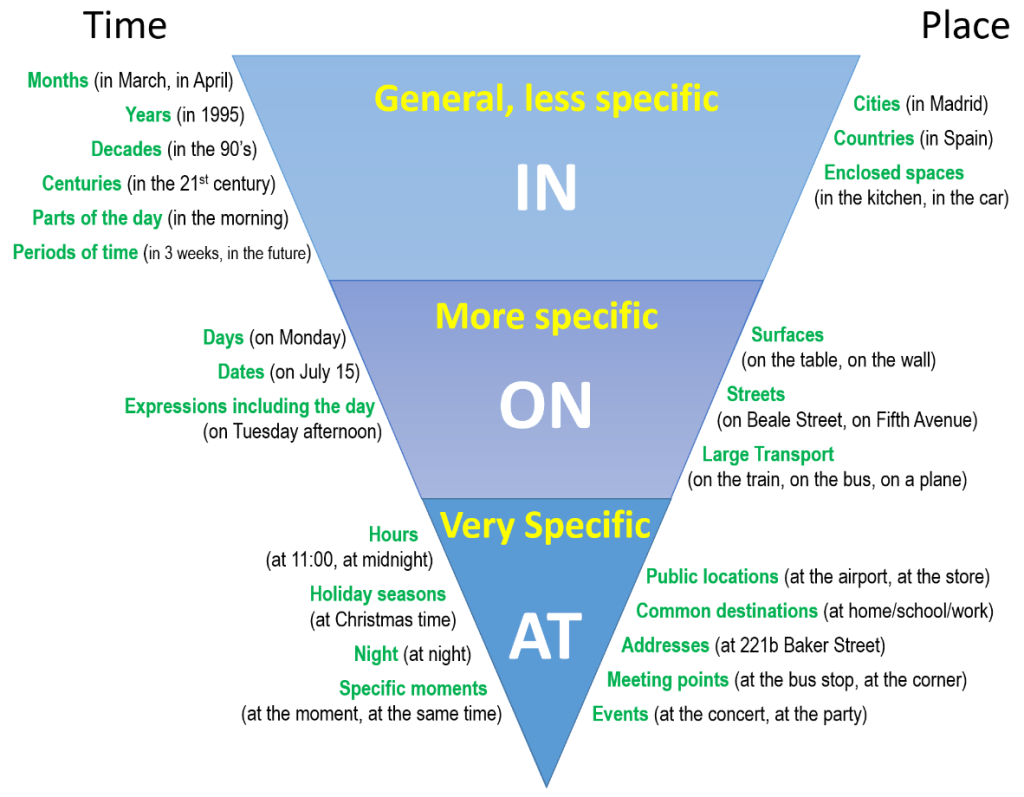-
- Las palabras y oraciones en inglés
- Los tipos de palabras esenciales para hablar inglés
- La estructura de oraciones en inglés
- Los pronombres personales
- El presente simple
- El presente simple
- Oraciones negativas en el presente simple
- Preguntas en el presente simple
- El verbo "be"
- El pasado simple
- El pasado simple
- Verbos irregulares en el pasado
- Pasado simple negativo e interrogativo
- "Be" en el pasado
- El futuro y verbos auxiliares
- El futuro simple
- Verbos auxiliares
- El presente continuo y perfecto
- El presente continuo
- El presente continuo para expresear el futuro
- El presente perfecto
- Contractions
- Adjetivos, adverbios y preposiciones
- Los adjetivos
- Los adverbios
- Las preposiciones
- Preposiciones de lugar
- Preposiciones de tiempo
- Los artículos
-
- Module 1
- There is - There are
- El comparativo
- El superlativo
- El imperativo
- Gerundios
- Question tags
- For, Since, Ago
- Have you ever...? How long have you...?
- Used to, be used to, get used to
- Used to vs would
- Have to vs Must
- I'd like y would you like?
- El pronombre "it"
- Too / Either, So am I / Neither am I
- Reported Speech
- La voz pasiva
- Expresar propósito
- I want you to... I told you to...
- Adjetivos y Pronombre Posesivos - Apostrophe 's
- Pronombres reflexivos
- Contables y No Contables
- This, That, These, Those
- One, Ones
- Collocations
- Adjetivos con -ed vs -ing
-
- Pronombres avanzados
- Some y Any
- Pronombres indefinidos
- No, None y Any
- All y Every
- Both, Either, Neither
- Cantidad y comparaciones
- Much, Many y A lot of
- A little y A few
- Not as...as
- Give me that book vs Give it to me
- Good at, Bad at
- Tiempos verbales avanzados
- Cuándo usar el presente perfecto
- Presente perfecto continuo
- Pasado continuo
- Pasado Perfecto
- Pasado perfecto continuo
- Verbos auxiliares
- will vs shall
- Will vs going to
- Will be doing vs will have done
- Can, could, be able to
- must vs can't
- May vs Might
- Los condicionales
- Zero conditional
- First Conditional
- Second Conditional
- Third conditional
- Introducción a los Phrasal Verbs
-
Premium
- Module 1
- Phrasal Verbs Upper intermediate
- Have to vs Must Upper intermediate
- Could have, should have, would have
- Should vs Must
- Have vs Have got
- Had better vs It's time
- Mixed conditionals Upper intermediate
- If I had known vs I wish I had known
- The Passive Voice
- have something done
- Verb + to vs Verb + ing
- Verbs that must be followed by ing
- Verbs that must be followed by to
- Prefer vs Would Rather vs Would Prefer
- No point in vs Not Worth
- When to use "the"
- Possessives 's' vs 'of'
- "Of mine" vs "My own" vs "On my own"
- There and It
- Each vs Every
- Relative clauses with who/which/that
- Relative clauses without who/which/that
- Relative clauses with whose, whom and where
- Advanced Relative Clauses
- Participle clauses
Preposiciones de tiempo
En la lección anterior aprendiste a usar "in", "at" y "on" como preposiciones de lugar. También se pueden usar como preposiciones de tiempo. Explicamos cómo usar los preposiciones de tiempo en esta lección.
Usa "in" para tiempos no específicos
Cuando nos referimos a partes del día, meses y años, usamos "in". Por ejemplo:
- Partes del día: in the morning, in the afternoon, in the evening
- Meses: in March, in December
- Años: in 2015, in 1995
- Periodos de tiempo: in 5 weeks, in 3 months, etc.
Usa "on" para días y fechas
Si especificamos el día, incluso en fechas, usamos "on":

FAMIHEART Custom Hoodies Design Your Own, T-shirts Portrait From Photo, Valentines Day Cus...
$17.99- On Friday, on Wednesday
- On March 15, on the third of May
Usa "at" cuando especificamos la hora
Por ejemplo:
- At 5pm
- At noon
- At lunch time
Excepciones
Sí, ¡siempre hay excepciones! Aquí tienes algunas que debes tener en cuenta:

OnePlus Nord N30 5G | Unlocked Dual-SIM Android Smart Phone | 6.7" LCD Display | 8 +128GB ...
$249.99- Aunque "night" es una parte del día, decimos "at night" y no "in night"
- En inglés americano se dice "on the weekend", y en inglés británico es "at the weekend" para referirse a los fines de semana.
- Cuando hablamos de un día festivo usamos "on" (ej. on Christmas day), pero si hablamos de la temporada (no solo el día), decimos "at" (ej. at Christmas time).

Haz al menos 2 ejercicios para completar esta lección

PULIDIKI Car Cleaning Gel Universal Detailing Kit Automotive Dust Car Crevice Cleaner Slim...
$8.99
 Diario
Diario